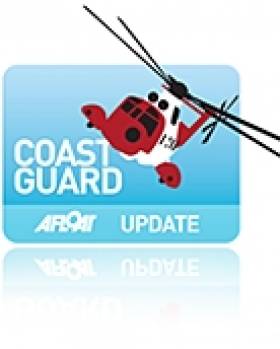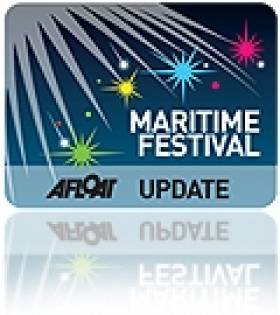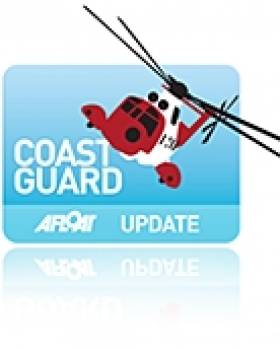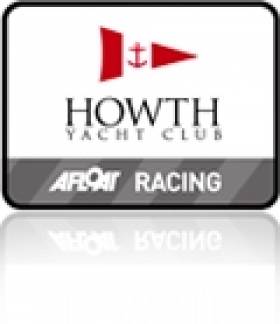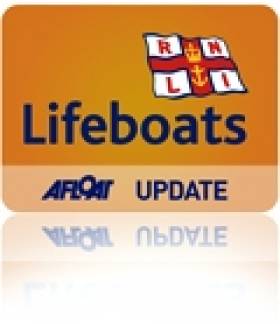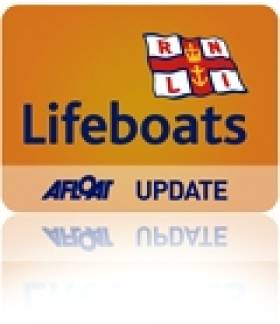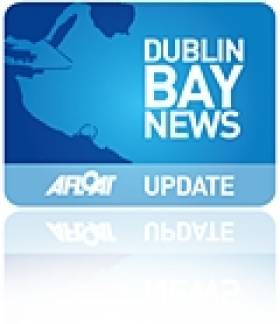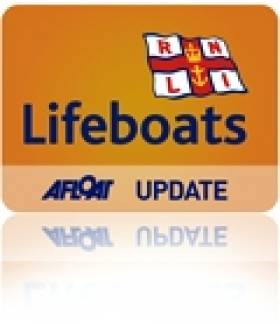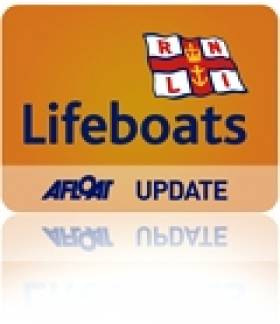Displaying items by tag: Howth
Howth Coast Guard Trains With Irish Red Cross
#Coastguard - Howth Coast Guard has blogged about its recent medical exercise with the Irish Red Cross.
The multi-casualty medical training exercise involved lowering a number of qualified and trainee emergency medical technicians (EMTs) into Whitewater Brook by the heights rescue team.
These EMTs served as serious trauma victims who were then retrieved through the joint effort of over 40 personnel between the two organisations who worked together to triage, treat and evacuate.
Another recent training exercise, as featured in the video above, involved the safe evacuation of a casualty with a lower limb fracture.
"One of the more common callouts we receive are for people enjoying walking or running in the area who slip and fracture a lower limb or ankle injury," said the North Dublin-based unit of the Irish Coast Guard.
"The team regularly train for this scenario, ensuring all members are able to stabilise, package, and evacuate by stretcher a casualty in this situation."
Student Sailing Worlds Selection Trials Conclude
#sywoc – There are two distinct strands in Irish university sailing these days. The annual National Team Racing Opens in Fireflies – won five weeks ago on Tralee Bay from 26 college teams by University of Limerick skippered by Ross Murray – continues to be the backbone of the national students' programme. This is as it should be. Team racing is a natural fit in college life, but it's equally natural that afterwards, most folk grow out of it.
However, with the success in recent years by the Irish colleges in the Student Yachting Worlds in France in the last week of October, this major international championship with one keelboat apiece has zoomed to the top of the agenda. With the availability of the SailFleet flotilla of J/80s, the top Irish college sailing clubs are able to have a proper selection series with fleet racing which emulates the championship itself, especially this year as J/80s will also be the boat used in France in six months time.
On top of that, University College Dublin are current world champions, and they have a place at the worlds as of right. So there has been a second team place in France up for grabs in a three day selection series spread over three weekends, concluding today in Howth where the J/80s are based this Spring.
The Student Worlds is a massive season-long commitment for a transient membership college sailing club to make, but they mustered seven teams at mid-series with UCD:Simon Doran; TCD:Scott Flanigan; UL: Rob O'Leary; DIT: Nessa Coady; CIT: Donough Good. Seventh team DCU, skippered by Ryan Scott, had already committed to a team racing series in France on the first weekend when this three-Saturday schedule for April was announced, so they've been allowed to compete the latter two weekends with average points allowed for their no-show first day in a series which will have no discards.
However, University of Limerick continue on a roll, and their helmsman Rob O'Leary only has to make sure he doesn't record a last place in either of today's two races to ensure that UL will be providing a two-pronged attack for Ireland along with UCD at the big one in France in October.
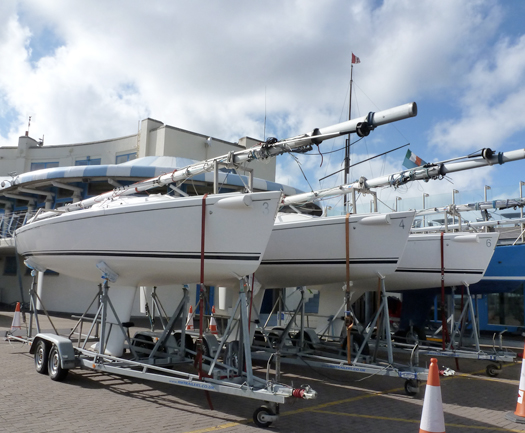
The People's Boats – the ISA SailFleet J/80s are a matter of quiet pride for the sailing community, successfully fulfilling their important role at key sailing centres Photos: W M Nixon
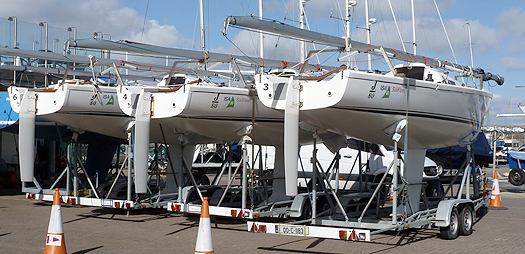
Tomorrow, the J/80s are back in action with the ICRA training day, and it's good to see them doing what they're intended for. The SailFleet concept is achieving exactly what everyone hoped, and we can be proud of them – they're The People's Boats. That said, we may need to organise some sort of fund-raising do - a gala dinner might fit the bill – to put right a problem with ISA SailFleet J/80 No 4. At least two bolts in the upper rudder gudgeon on the transom are producing an unsightly stain. Of course it can't be rust. It just can't be rust. It must be a stain of some sort. But nevertheless, a focused fund-raising drive may be necessary to raise the resources to replace those bolts with fastenings in proper naval grade SS 316. It's the least we can do for The People's Boats.
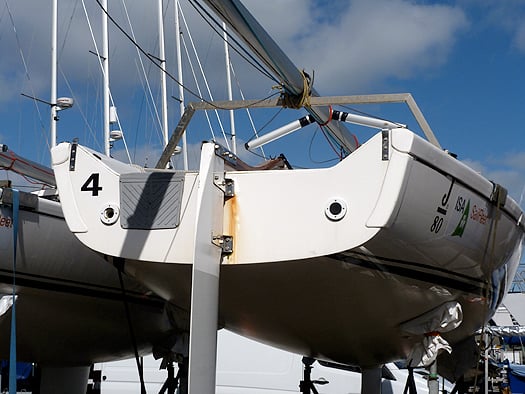
It just couldn't be rust....but this stain needs some SS 316. Photo: W M Nixon
Lifeboat Prawn Push in aid of Howth RNLI
#lifeboat – As part of the Dublin Bay Prawn Maritime Festival in Howth, North Dublin a Prawn Push in aid of Howth RNLI will take place on Saturday 27th April at 3pm in Howth.
Teams of three wearing maritime themed fancy-dress will take part. One member of the team will push another team-member in a pram or wheelbarrow. The other team-member will have the task of passing around a collection bucket until its weight matches the weight of a kilo of prawns.
The route will start at the Top House Pub in Howth village, via Church Street to Findlater's Pub and back to the children's playground near the east Pier. Rehydration stations will be set up along the route where competitors will have to down a drink as fast as they can. Prizes awarded will include winners of the race and best fancy-dress. Prize-giving will take place at the Festival Marquee immediately after the race.
Teams can be from pubs, clubs or groups. All participants must be over 16 years of age. Teams must supply their own prams or wheelbarrows. Entries and enquiries can be made to Eddie Caffrey on 086 832 0786 or by email to [email protected] .
'Funds raised by the Lifeboat Prawn Push will ensure that our volunteer lifeboat crews go to sea with the best equipment available to ensure their safety when saving lives at sea' said Rose Michael, Howth RNLI Fundraising Chairperson.
Howth Coast Guard Assists Powerless Boat In Drogheda
#Coastguard - The Howth unit of the the Irish Coast Guard responded this weekend to a vessel that lost power at the mouth of the River Boyne.
Howth's coastguard crew were undertaking helm training with a passage to the Drogheda unit to support the Drogheda Marina launch when they were notified that a ski-boat planning to join the flotilla had lost power on the Drogheda Bar.
The vessel, with four people aboard, was taken under tow - while a mother and child on a second vessel suffering from serious sea-sickness were also transferred to the coastguard boat.
As previously reported on Afloat.ie, the Drogheda Port Company undertook dredging works in January this year on the entrance to the port on the River Boyle, following earlier works in 2010 to remove sand accumulating at Drogheda Bar.
Howth Kicks off the Sailing Season with Spring Warmer Series
#HYC – Howth's Spring Warmer Series starts tomorrow and continues 'til April 20th, providing a series for Cruiser, J24, SB20, Puppeteers, Squibs and Etchells keelboat classes.
The format will be the same as last year with two windward/leeward races back to back over three Saturdays. The event is sponsored by Key Capital partners.
The Dun Laoghaire SB20 class have been canvassed to support the first event of the season, the perfect lead up to the class Eastern championships at the same venue on the 27/28 April.
Howth Duo Cycling From London To Paris For RNLI
#HowthRNLI - Howth locals Jennifer Murphy and Brendan Mulligan will be taking part in the London to Paris Bike Ride in aid of Howth RNLI.
The 377km charity challenge will take place between 23 and 26 August. Riders will depart from London and cycle past Hampton Court and through the North and South Downs to Portsmouth.
After crossing the English Channel on a ferry they will arrive in France at Caen and travel through the French countryside to Evreux. On the final day, all the cyclists will head to their final destination of the Arc de Triomphe in Paris.
Murphy said: "We decided to do the challenge for Howth RNLI because it is a local charity. We know some of the volunteer crew, including my boss!"
The duo are collecting sponsorships at their MyCharity.ie page HERE.
And according to Howth RNLI's Rise Michael, the funds they raise will ensure the north Dublin volunteer lifeboat crews can go to sea with the best equipment available, preserving their safety when saving lives at sea.
Meanwhile, Howth RNLI is hosting a 'boat jumble' sale at Howth Sea Angling Club from 10.30am to 1pm on Saturday 13 April.
All are welcome to bring along boat gear, fishing gear, dinghies, wetsuits, sails, books and any other nautical-related items.
Tables cost €20 each, with 25% of sales donated to the RNLI. Alternatively, items can be donated to ‘The Bosun’s Locker’ with all sale proceeds going to the RNLI.
The RNLI Sea Safety Team will be on hand to check lifejacket safety and give advice, and RNLI souvenirs will also be available. For more details contact Barbara Sargent on 01 832 5392 or Rose Michael on 087 255 2726.
Michael adds that the funds raised by the jumble sale will go towards Howth RNLI's current fundraising project to fund the running and maintenance costs of the lifeboat station for a week.
Lucky Escape for Dad & Daughter as Waves Crash Over Howth Pier
#rnli – A father and daughter had to be rescued early this morning by Howth RNLI off the East Pier, after they became stranded and were forced to take shelter from breaking waves. The two were out walking on the pier at high tide when they realised they could not safely continue. The dangerously surging sea had resulted in waves crashing over the pier and into the harbour and the area was unsafe to walk in.
Howth RNLI's inshore lifeboat launched and went to the aid of the two stranded casualties. A volunteer lifeboat crew member got on to the pier and walked them through the crashing water and into the safety of the lifeboat. Both were brought to the Lifeboat station and were checked over by paramedics. There was no serious injury but the pair were extremely cold and wet; neither needed treatment.
Howth RNLI inshore lifeboat helm Fred Connolly said 'they were lucky to have taken shelter as they would have most definitely have been washed into the sea while trying to make their back. We would urge caution when people are out walking near exposed areas such as piers or cliffs as the waves can be quite high and powerful'
Harbour2Harbour Walk Around Dublin Bay This Sunday
#Harbour2Harbour - There's not much time left to register for the 2013 Harbour2Harbour Walk in aid of Aware on St Patrick's Day.
The 16.2 mile walk around Dublin Bay begins at 10.30am on Sunday 17 March, taking four to five to complete, and it's your choice whether you begin at Howth Harbour and walk to Dun Laoghaire Harbour or vice versa.
Organisers say over 1,200 people took part in las year's walk, raising more than €40,000 for Aware.
Apart from the great stretch of the legs and experiencing the beautiful vistas of Dublin Bay, the main aim of the day is to raise funds for Aware Support Services, and once registered to take part you will receive information on how to raise sponsorship.
Online registration is €20 per individual or €30 for a group of 2 (children under 16 are free). Late registration will also be available on the morning of the walk itself.
More information about the day can be found at Aware's Harbour2Harbour webpage HERE.
DCU Surf 'n' Sail Club Raise €800 for Howth RNLI
#rnli – Members of Dublin City University's (DCU) Surf 'n' Sail club recently presented a cheque for €823 to Howth RNLI. The students raised the money by organising a Christmas Charity Swim in aid of Howth RNLI.
On 12 December 2012, 30 students from DCU braved the wintry waters of Balscadden Bay near Howth for their charity swim. Some of the swimmers even dressed up in costumes for the event. After thawing out around a bonfire, they retreated to Howth Yacht Club for hot lunches.
"We decided to raise money for the Howth RNLI because, we are all water users and wanted to show our appreciation for those who would be rescuing us if anything was to happen, most of us sail in various clubs around Dublin Bay. We are a water sports club, so it made perfect sense for us to support a water based charity. Overall the whole committee thought that the RNLI is a very deserving charity and the obvious choice for us to raise funds for", said Grace Newport, Secretary of DCU Surf 'n' Sail.
'The funds raised by the students in DCU will go towards our current fundraising project to fund the running and maintenance costs of the lifeboat station for a week,' said Howth RNLI Fundraising Chairperson Rose Michael.
Schoolkids Raise €1,300 for Howth RNLI
#RNLI - Children from Scoil Oilibhéir Naofa in Kilcloon, Co Meath yesterday visited the Howth RNLI lifeboat station to present a cheque for €1,300 raised by pupils through a Christmas fair and a 'Chore Tuesday' at their school.
Project teams from the class presented posters and poems about sea safety, the crew kit and the lifeboat. They also met lifeboat station mechanic and crew member Ian Sheridan, who was so impressed by their work that he presented them with a special RNLI flag to hang in their classroom. All of the pupils then had the opportunity to get onboard the inshore lifeboat.
Following a visit to the school by the RNLI Education Team before Christmas, pupils became interested in the lifesaving work carried out by the volunteer lifeboat crews, and were inspired to organise a fundraiser to help save lives at sea.
"The funds raised by the pupils of Scoil Oilibhéir Naofa will go towards our current fundraising project to fund the running and maintenance costs of the lifeboat station for a week," said Howth RNLI fundraising chair Rose Michael.


























